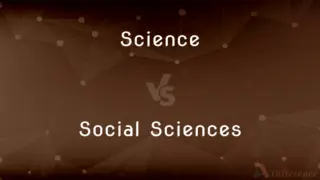Hypothalamus vs. Pituitary Gland — What's the Difference?
By Tayyaba Rehman — Published on November 8, 2023
The hypothalamus is a section of the brain responsible for hormone production and regulation, and behavioral functions. The pituitary gland, controlled by the hypothalamus, releases hormones that influence various physiological processes and other glands.

Difference Between Hypothalamus and Pituitary Gland
Table of Contents
ADVERTISEMENT
Key Differences
The hypothalamus is situated within the brain and serves as a crucial component for regulating an array of physiological processes, encompassing hunger, thirst, and thermoregulation. On the other hand, the pituitary gland, often referred to as the "master gland," regulates several other glands in the body and releases hormones influencing growth, blood pressure, and energy management.
In the axis of hormonal control, the hypothalamus plays a vital role, producing releasing and inhibiting hormones that regulate the pituitary gland. Differently, the pituitary gland, while influenced by the hypothalamus, directly affects the functions of other glands (like the thyroid and adrenal glands) by producing various hormones, which in turn regulate several body functions.
The hypothalamus communicates with the pituitary gland through a system involving hormone secretion into blood vessels, connecting the two entities. Conversely, the pituitary gland, after receiving signals from the hypothalamus, secretes hormones that impact numerous physiological functions and also control other endocrine glands.
Functionally, the hypothalamus is known to also control circadian rhythms and appetite, involving complex mechanisms and various neurotransmitters. The pituitary gland, while known for its endocrine functions, also plays a pivotal role in regulating growth through the release of growth hormone, impacting cell reproduction and regeneration.
Moreover, the hypothalamus is associated with behavioral and emotional responses, contributing to expressions of anger, fear, and pleasure. While, in contrast, the pituitary gland does not directly regulate emotional responses but plays a crucial role in physiological processes such as metabolism, menstruation, and lactation through hormone release.
ADVERTISEMENT
Comparison Chart
Location
Part of the brain
Below the hypothalamus
Function
Regulates various physiological processes
Releases hormones affecting physiological processes
Control
Produces hormones that control the pituitary gland
Controlled by the hypothalamus
Impact on Behavior
Directly impacts behavior
Does not directly regulate behavior
Association
Primarily associated with the neural system
Primarily associated with the endocrine system
Compare with Definitions
Hypothalamus
Regulator of the body’s physiological stability (homeostasis).
The hypothalamus plays a key role in maintaining body temperature.
Pituitary Gland
Regulator of growth and development.
Disorders of the pituitary gland can impact physical growth in children.
Hypothalamus
Manager of circadian rhythms.
The hypothalamus helps regulate our sleep-wake cycle.
Pituitary Gland
Influencer of other endocrine glands.
The pituitary gland secretes hormones that regulate the adrenal gland.
Hypothalamus
Controller of various behavioral functions.
The hypothalamus influences the expression of emotions like fear.
Pituitary Gland
Hormone producer affecting various body functions.
The pituitary gland releases growth hormone, influencing cellular regeneration.
Hypothalamus
Supervisor of metabolic processes.
Hunger and thirst are regulated by the hypothalamus.
Pituitary Gland
Maintainer of metabolic stability.
The pituitary gland plays a crucial role in managing metabolic rates.
Hypothalamus
Coordinator of the endocrine and nervous systems.
Through releasing hormones, the hypothalamus communicates with the pituitary gland.
Pituitary Gland
Participant in reproductive processes.
The pituitary gland regulates menstrual cycles through hormone release.
Hypothalamus
The part of the brain that lies below the thalamus, forming the major portion of the ventral region of the diencephalon and functioning to regulate bodily temperature, certain metabolic processes, and other autonomic activities.
Hypothalamus
(anatomy) A region of the forebrain located below the thalamus, forming the basal portion of the diencephalon, and functioning to regulate body temperature, some metabolic processes and governing the autonomic nervous system.
Hypothalamus
A basal part of the diencephalon governing autonomic nervous system
Common Curiosities
What is the main function of the hypothalamus?
The hypothalamus regulates physiological processes and behavioral functions.
What does the hypothalamus regulate besides hormones?
It regulates behaviors, emotions, and circadian rhythms.
Is the pituitary gland part of the brain?
No, but it is connected to the hypothalamus, which is part of the brain.
Is the hypothalamus linked with appetite control?
Yes, it plays a crucial role in regulating appetite.
What is often termed the "master gland"?
The pituitary gland is commonly referred to as the "master gland."
Does the hypothalamus control the pituitary gland?
Yes, the hypothalamus regulates the pituitary gland through releasing and inhibiting hormones.
Does the hypothalamus directly impact other endocrine glands?
No, it primarily controls the pituitary gland which in turn affects other glands.
What role does the pituitary gland play in reproduction?
It releases hormones that regulate reproductive organs and processes.
Which gland impacts growth and development significantly?
The pituitary gland, through releasing growth hormone.
Does the hypothalamus impact emotional responses?
Yes, it plays a role in expressing several emotions.
Is the hypothalamus larger than the pituitary gland?
No, the hypothalamus is smaller than the pituitary gland.
Can problems with the pituitary gland impact physical development in children?
Yes, especially in aspects of growth and puberty.
Can a disorder in the pituitary gland affect metabolism?
Yes, as it regulates hormones involved in metabolic processes.
What physiological processes does the pituitary gland regulate?
Including growth, blood pressure, metabolism, and reproduction.
Are the hypothalamus and the pituitary gland structurally connected?
Yes, they are connected through a portion known as the pituitary stalk.
Share Your Discovery

Previous Comparison
Primates vs. Non Primates
Next Comparison
Science vs. Social SciencesAuthor Spotlight
Written by
Tayyaba RehmanTayyaba Rehman is a distinguished writer, currently serving as a primary contributor to askdifference.com. As a researcher in semantics and etymology, Tayyaba's passion for the complexity of languages and their distinctions has found a perfect home on the platform. Tayyaba delves into the intricacies of language, distinguishing between commonly confused words and phrases, thereby providing clarity for readers worldwide.
















































